Kay and Julian Burton discuss philanthropy, their foundation, Bali bombing and giving back
The gift of giving seems like a simple concept. But Kay and Julian Burton have discovered there’s still plenty of work to do, and they’re determined to bring about change.
SA Weekend
Don't miss out on the headlines from SA Weekend. Followed categories will be added to My News.
Washington DC is a 14-hour drive southeast from a rural town in northern Maine, but for a young Kay Burton it may as well have been on a different planet.
Burton had, by her own admission, a reasonably uncomplicated upbringing.
Her mum, Susan, was an artist and a potter who would hold workshops for special needs kids and disadvantaged youth.
Her dad, Tom, turned his back on the corporate world for a life of teaching and volunteering.
Both had a strong ethos of giving back to their communities and young Kay took notice.
In many ways, she says today, the idea of service must have formed part of her DNA.
Then, every Christmas, they would venture to her grandparents’ home in the nation’s capital, where Kay would be exposed to the unfamiliar sight of homeless people on the street; pockets of poverty of which she had previously been oblivious.
It shocked her to the core.
“All of a sudden I started seeing homeless people sleeping on the streets and I was very sheltered in northern Maine,” Burton says.
“I started seeing these people sleeping rough and doing it tough, and I started to ask, ‘Well, why is that?’ Because I’d never been exposed to that. I wanted to know where this disadvantage was coming from.
“I remember that we’d be walking down to go to the museums and I would be handing my lunch out behind me, because I felt a need to help, because I could see a need.”
They were formative experiences, which carried through her university years, into an internship on Capitol Hill and then a job in the office of Senator Susan Collins (who is still in the chair and Maine’s longest serving senator).
Working with the senator, she was exposed to many diverse interest and community groups, who were all fighting passionately to get their cause at the top of the list.
It was, she reflects now, “philanthropy on steroids”.
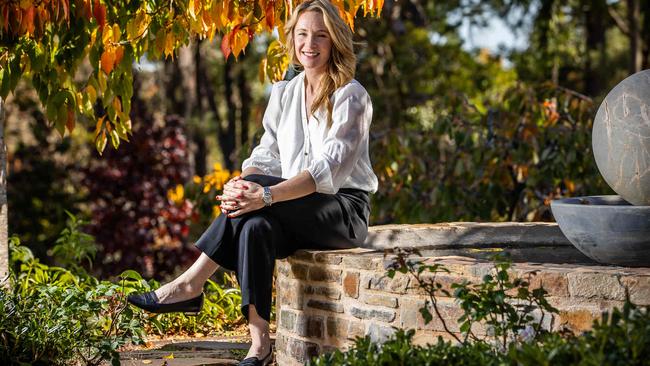
“I was so amazed by the passion and the energy that people were willing to put behind causes they dearly supported,” she says.
From there she fell for an Australian, and decided on a whim to move to the other side of the world … more precisely, Adelaide.
She toyed with a future as a political staffer but instead, staying true to her roots, opted for a job managing the communications and fundraising for SAHMRI (South Australian Health and Medical Research Institute).
In those days there was only a handful of staff and, with a base on King William St, the building was a far cry from the elaborate “Cheesegrater” building which now holds pride of place on North Tce.
After her relationship ended, she happened across a bloke who was raising money for burns survivors and their families.
His name: Julian Burton, champion SANFL footballer, and survivor of the 2002 Bali bombings.
They fell in love, she became stepmum to his two young kids, and they would end up marrying and having a family together.
Much of Kay Burton’s life has been geared towards fundraising, community service and philanthropy. Her most recent gig was as state manager for Philanthropy Australia.
She stresses she’s neither special, nor wanting to make a name for herself.
In truth, she’s more than a little hesitant about putting her name out there (especially in a city like Adelaide where a lot of people are doing a lot of good work and it can be difficult to get people talking on the subject).
However, she can’t escape the fact that philanthropy is something that has made her jump out of bed for as long as she can remember.
She also knows the only way to grow something is to spread its message.
And so Kay Burton is leading a charge to try and change, or at the very least influence to a significant degree, how philanthropy is done in her adopted hometown.
BREAKING DOWN THE BARRIERS OF GIVING
There are a lot of barriers that seem to exist to stop people getting into philanthropy.
These include, but are by no means exclusive to: a belief you need to be super rich (you don’t), little idea of how to start in the first place, a lack of connections, a dearth of time, the absence of an ingrained culture of giving.
You also might have little idea what it actually means (the Oxford definition is “the practice of helping the poor and those in need, especially by giving money …”).
There’s also that old chestnut: Tall Poppy Syndrome.
It’s different in the US where people will gladly stand up and announce how much they are giving a certain group.
In Australia, such actions are frowned upon. And the smaller the city, the bigger the frowns.
Kay Burton understands those differences but also sees an opportunity.
She doesn’t want Australia to become a microcosm of the US, but believes more conversations and more openness on philanthropy can and will be a good thing.
Burton quotes a figure, supported by ABS data, saying it is estimated more than $112bn will be transferred via intergenerational wealth in South Australia over the next decade, mainly through inheritance.
The key is to grab at least some of that for groups that really need it.
“I feel like we’re at a point where if I can work really hard for the next five years to inspire this next generation coming up and coming through, who’s going to inherit this wealth, about their options of giving back to the communities that support them …” she reflects.
In this she has a strong ally in retired businessman Geoff Day, who is the founder of the Day Family Foundation.
Day praises Burton’s leadership and ambition “to one day see a flourishing sector, with more philanthropists talking the talk, as it is the personal stories that will inspire others to grow their capacity to give more generously”.
“This leadership needs to come from both this generation of philanthropists and their children, the not for profit sector and the business community,” he says.
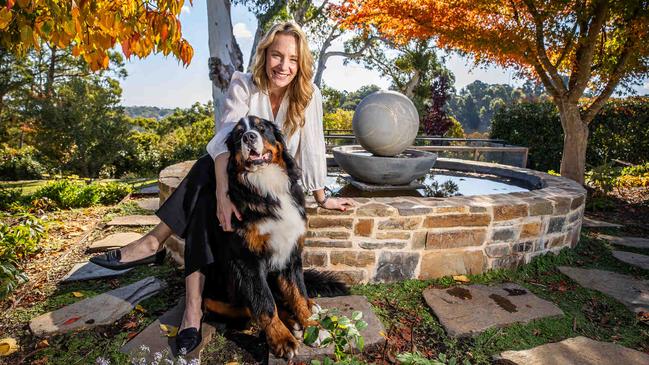
In his 2023 book Give While You Live, industry expert Peter Winneke says the philanthropic sector in Australia could be transformed overnight if families gave more consideration to the critical issue of inheritance, namely how much parents really need to leave their children.
“We need to show families how thoughtfully their wealth can be used for the benefit of the community,” he says, while echoing Warren Buffett’s famous line of “leave enough for your kids to do anything in life, but not enough to do nothing”.
The other key focus for Burton is tapping into the stuff that makes Adelaide, well, Adelaide.
“South Australia, being the size that it is, trades on relationships,” she says.
“We operate very differently to the eastern seaboard, and other states.
“Everyone knows each other. And so I thought, ‘Well, why can’t we in a state the size of South Australia come up with a network where we can just connect people?’
“Because that’s what people were crying out for – the human connection – especially in a post-Covid world. Everyone wanted to connect more, they wanted to network, they wanted to engage.
“They wanted to learn from others and want to speak to others.”
Burton happened on the need for a change in approach while doing pro-bono consulting for local charities around 2018.
“What became very apparent to me was that everyone was stuck struggling with the same strategy,” she says.
“And I was like, ‘We’ve got all these incredible organisations in South Australia doing wonderful work, how do we connect to the people who are passionate about what they’re doing?’
“Every organisation I was speaking to, it was the same thing – it was a cookie-cutter approach: Who are the high net worth individuals? Who has the capacity to help us realise our goals?
“But we don’t know how to connect to them, we don’t have the time, we don’t have a big marketing budget, so we don’t have the connection.
“After we started the Burton Foundation, I realised that some funders were experiencing a similar disconnect. And a lot of people were saying, ‘We just don’t know what’s out there; we want to give, we want to give more but we don’t know where to start’.”
So, Burton thought, “How can I try to help connect all these disparate dots?”
From there, SA Philanthropy Network was born.
It’s a lot of things. It’s coffee meetings (upwards of 100 so far). It’s networking events. And it’s a free website which aims to connect individuals and organisations, including philanthropists, non-profit organisations, professional advisers, corporate philanthropists, industry experts, and leaders.
It has a lot of worthy objectives but if you boil it down it wants to create new collaborations and funding opportunities; spark more conversations about philanthropy, break down stereotypes about philanthropy, be a disrupter, be a myth buster.
“I think the reason why a lot of people don’t get involved in philanthropy in the first place is they think it’s too hard, that there are roadblocks and you need to be very wealthy,” Burton says.
“That’s just not the case. Some of the most generous people in this day and age are the ones that are giving $5 a month to an organisation that they hold near and dear to their hearts.”
In the midst of a cost of living crisis and high inflation, the argument could be made that Burton’s timing is pretty on point.
Launched in February, the network now has upwards of 300 members, spread mainly by word of mouth.
The goal is to grow this by a lot. The key right now is to get the word out there.
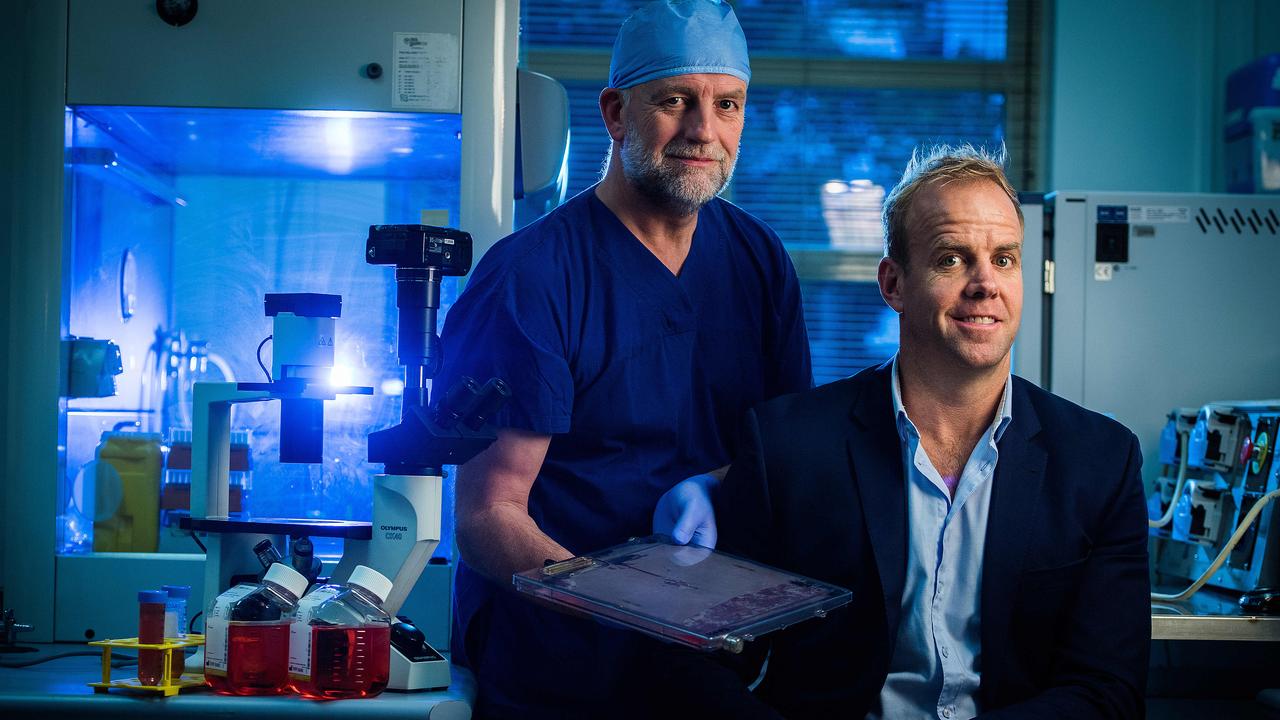
BUILDING A LEGACY
Julian Burton OAM is a towering figure with a handshake that makes your elbow ache.
He bounds around the house with pup Bo, a sociable Bernese mountain dog, in between taking what seems a constant stream of mobile phone calls.
When he does finally pause for a breather, he admits the past two-plus decades have been, to put it mildly, a bit of a whirlwind.
In the wake of the Bali tragedy, during which he was severely injured (with, among other things, third degree burns to over 30 per cent of his body), he gave away teaching and football, and created the Julian Burton Burns Trust.
The Burns Trust closed in 2018, having raised in excess of $20m for the community, as Burton and his close friend Professor John Greenwood AM focused on developing an artificial skin technology.
Greenwood developed a process to assist in growing artificial skin and the duo worked on a way to commercialise the process.
Greenwood and Burton collaborated with the ASX listed PolyNovo, which now sells the product globally, and now they are collaborating with Royal Adelaide Hospital Kidney and Islet Transplantation director Professor Toby Coates AO to use the technology to treat Type 1 diabetes.
Burton lets out a wide smile when he reflects on how Greenwood has recently retired from full-time work and is now travelling the world … as a rock star.
“He always was an amazing musician,” he says, laughing. “I’m really happy for him. He’s a dear friend of mine. He worked amazing hours and what he did … he deserves all the accolades in life that he gets.”
On top of all this, Julian and Kay set up the Burton Foundation, which supports charities such as Operation Flinders, the HAS Foundation and the Sammy D Foundation, to give back to their community but also as an example to children Max, Archie, Sebastian, Alexander and Mya (it seems to have caught on, Max and his mates took part in a Schnitty for Sam campaign that the Sammy D Foundation was running. The Burton Foundation matched all the donations and they raised more than $55,000).
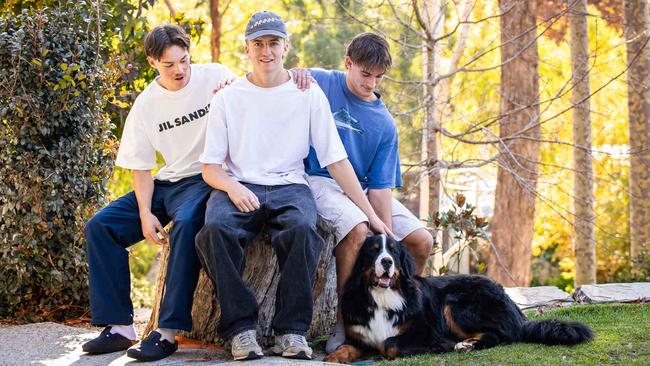
Today, Julian Burton says that while he’s still involved in his foundation’s work and has several business interests, he is happy to take a bit of a back seat, at least for now.
“I feel like I had a wonderful time and enjoyed a bit of time in the sun with my passions and my purpose,” he says.
“And I was very lucky to be surrounded by some wonderful people that helped me. But I always said to Kay, ‘There will come a time when you’ll come up with a passion you’ll want to do, and we’ll switch’.
“And it’s working. I always said if I got to a position where I could (swap roles) the number one gift we can give our families is time. And one of the greatest gifts we can do is try and raise good quality, grounded, humble children.”
Like Kay, giving back to the community was an integral part of Julian’s upbringing.
“I came from a small country town, Cowell on the Eyre Peninsula, and I had two parents that always found time for other people, even when they were having some challenges in their own life,” he says.
“On the farm, they always had time to help other people and put themselves second; they always put us kids first. They went without a lot and as you get older you realise how lucky you were and how grateful you are.”
It helped set him on a path to teaching (he would become a PE teacher at Woodcroft College) and football.
“I think it’s always been a part of my DNA, giving and helping, and that was the reason I went into teaching,” he says.
“One of the parts of football that I did enjoy was spending time with juniors and supporters and giving back to the community. It was always a part of my life.”
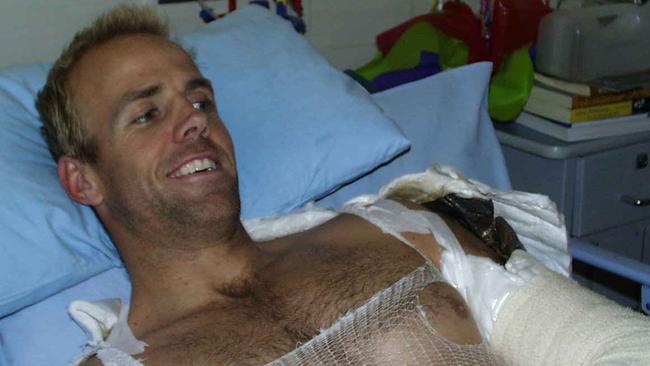
He says the Bali tragedy seemed to push him further into that space than he had previously thought possible.
“Once I got into that space, I knew I was very lucky to be alive and there were a lot of people that helped me and looked after me in a tough situation, and I thought this was a chance for me to say thank you and give something back,” he says.
Reflecting on that October 2002 night in Bali, which claimed the lives of 202 people, including Sturt footballer Josh Deegan, club official Bob Marshall and a third South Australian, 19-year-old Angela Golotta, Burton says his perspective is pretty simple these days.
“I just see it as, I’m still here, I’m a father of five, I’m healthy, I have a wonderful partner in life, I haven’t missed out on anything in my life, when there’s 202 other people that never got that chance,” he says.
“I think in my own subconscious I just come back to the view that I’m extremely lucky because there’s many families around the world that lost a loved one.”
And so, ever since, he’s been determined to pay it forward.
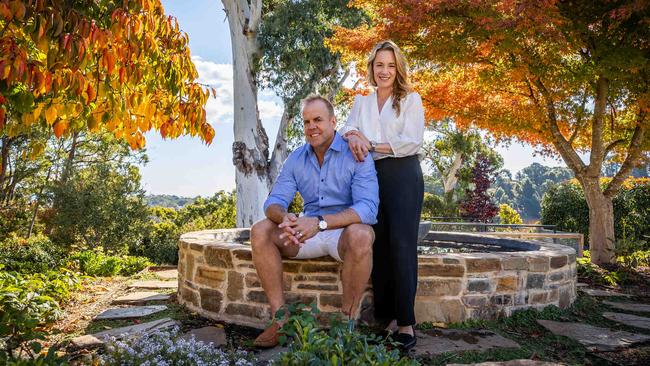
SO WHAT’S THE POINT?
So why get involved in philanthropy in the first place? It’s a good question and there’s no one answer.
But apart from the obvious community and social benefit, speak to pretty much anyone involved in philanthropy and they’ll say, at the end of the day, it makes them feel pretty good.
(The American Psychological Association quotes a study by the University of Zurich which found people who spent money on other people had more generous and fair interactions with other people and reported higher levels of happiness, known as a “warm glow” effect.)
“There’s a quote in Peter’s book which I love, ‘Have you done your best work yet?’,” Kay Burton says.
“So whether or not you’re a young mum, or are successful in your own business, or you’ve come into a significant inheritance, what is your purpose and meaning in life?
“You know, for Julian and me that’s helping others, it’s giving back. Family first and then helping others. It’s not tangible, it’s not a product, it’s not something you can put in a jar and sell. But if you can talk about the joy that you get from giving more, and create more conversations, I think that can be quite contagious.”
For Kay Burton and her family, there’s the wider question of what they leave, admitting, after some pressing, that she’s not making a cent from her new venture.
“We sometimes think about what we would like our legacy to be,” she says.
“Does that mean a big house and flash cars or trips around the world, or does it mean the impact that you’ve had in the community, or the impact you’ve had on other people.
“If you’ve touched someone else’s life, that, to me, means more than anything material.”





